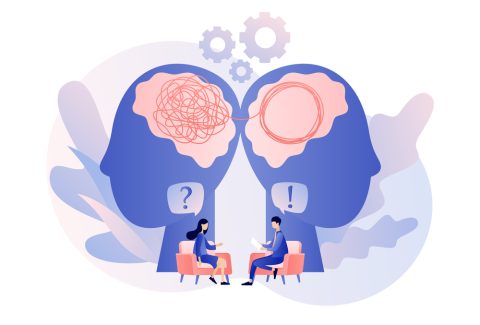Exploring Existential Questions in Logotherapy: Finding Meaning in Life’s Fundamental Questions

Exploring Existential Questions in Logotherapy: Finding Meaning in Life’s Fundamental Questions
Existential questions are central to the human experience. Who are we? What is the purpose of our lives? What happens when we confront death? How do we navigate suffering? These are questions that transcend cultures, religions, and philosophies, yet they are questions that all humans must grapple with at some point in their lives. Viktor Frankl[1], the founder of logotherapy, addressed these profound existential inquiries in his work, arguing that the search for meaning is the primary motivating force in human beings.
In this article, we will explore how logotherapy engages with existential questions and how the answers to these questions can lead to personal growth, healing, and a deeper sense of purpose. Through the lens of logotherapy, we can find the tools to answer life’s existential challenges in ways that foster resilience and fulfillment.
The Foundations of Logotherapy
Logotherapy[2], or “meaning-centered therapy,” is a form of existential analysis founded by Viktor Frankl. Frankl developed this approach after his experiences as a concentration camp prisoner during World War II.[3] Unlike Freud’s psychoanalysis, which emphasizes the pursuit of pleasure, or Adler’s individual psychology, which focuses on the will to power, Frankl’s logotherapy posits that the fundamental human drive is the search for meaning.
At its core, logotherapy is based on the idea that life’s meaning can be discovered, even in the most difficult or painful of circumstances. Frankl argued that people who find meaning, even in suffering, can endure far more than those who do not perceive meaning in their lives. In fact, Frankl often cited his own survival in the concentration camps as evidence that people can survive unimaginable suffering as long as they can find a sense of purpose in their experience.[4]
The Key Existential Questions in Logotherapy
Logotherapy engages with several key existential questions that lie at the heart of human life. These questions often arise when individuals confront difficult situations, such as trauma, loss, illness, or the awareness of their own mortality.[5] Frankl identified the answers to these questions as essential to finding meaning in life.
Why do I exist?
The question of existence and purpose is central to logotherapy. Frankl believed that human beings have a deep need to find meaning in their lives, and this search is what gives life direction.[6] He described this search for meaning as a “will to meaning,” which contrasts with the “will to pleasure” or the “will to power” emphasized by other psychological theories. In logotherapy, individuals are encouraged to explore what gives their life purpose, whether through work, relationships, or service to others.
Practical application: In therapy, individuals might be asked to reflect on moments in their life when they felt fulfilled or meaningful. By identifying patterns or themes in those experiences, they can begin to uncover what truly matters to them and orient their lives accordingly.
What does suffering mean?
Suffering is an inescapable part of life, and how we respond to it plays a critical role in shaping our experience. Frankl believed that suffering itself is not meaningless. In fact, he suggested that individuals can find meaning in their suffering, especially when they face it with courage and dignity. In extreme situations, such as in the Holocaust or terminal illness, people who can find meaning in their suffering are better equipped to survive and thrive.
Practical application: Frankl’s technique of “attitudinal value” helps people find meaning in suffering by encouraging them to take a responsible and active stance toward it. A person who has lost a loved one might find meaning by channeling their grief into supporting others who are going through similar experiences. This process of reframing suffering is a cornerstone of logotherapy and can transform negative experiences into opportunities for growth.
How do I face death?
The awareness of our mortality is a powerful existential concern. Logotherapy does not shy away from the reality of death but rather encourages individuals to confront it.[7] Frankl believed that acknowledging the inevitability of death can actually lead to a fuller, more meaningful life. By recognizing that life is finite, we can gain clarity on what is truly important and make choices that align with our values.
Practical application: In therapy, clinicians might encourage clients to reflect on their own mortality to help them re-prioritize their lives. This exercise is not meant to be morbid but to instill a sense of urgency to live authentically and meaningfully. A person might reflect on what they want to leave behind or how they want to be remembered, which can inform their actions in the present.
What is the meaning of my relationships?
Human connections are integral to finding meaning in life. Frankl emphasized that we do not find meaning[8] in isolation but in relationship with others. Whether it is a family member, a friend, or a romantic partner, our relationships offer opportunities for love, contribution, and shared purpose. In logotherapy, relationships are seen as a vital source of meaning and fulfillment.
Practical application: In therapy, a client might be encouraged to reflect on the meaning of their relationships, focusing on how these connections contribute to their sense of purpose. A person might reframe a difficult relationship as a space for personal growth or a challenge that can lead to greater understanding and compassion.
What does freedom mean in my life?
Logotherapy holds that individuals have the freedom to choose how they respond to life’s circumstances. This freedom exists even in the most dire situations, such as a concentration camp, where Frankl demonstrated that the mind can remain free, even when the body is physically constrained. The freedom to choose one’s attitude toward suffering, hardship, or fate is a central theme in logotherapy and offers individuals a powerful tool for personal empowerment.
Practical application: In therapy, clients might explore where they feel they lack control and work on developing their “freedom of attitude.” This involves recognizing that while we may not be able to control external circumstances, we always have the power to choose our response.
The Importance of Existential Reflection in Therapy
Logotherapy encourages deep existential reflection, which allows individuals to confront life’s biggest questions in a purposeful and structured way.[9] By engaging with these questions, clients can discover what truly matters to them and what they want to devote their lives to. This process is not about finding easy answers but rather about cultivating the courage to face uncertainty and discomfort with a sense of curiosity and openness.
Existential reflection can be transformative for individuals facing crises, loss, or despair. By helping clients navigate their existential concerns, logotherapists assist them in finding a renewed sense of purpose, even in the face of suffering or death.
Conclusion: The Journey Toward Meaning
Viktor Frankl’s logotherapy provides powerful tools for addressing life’s deepest existential questions. Rather than viewing these questions as burdensome or overwhelming, logotherapy encourages individuals to explore them as opportunities for growth, healing, and meaning. By grappling with the questions of existence, suffering, death, relationships, and freedom, we come to realize that the search for meaning is a lifelong journey that can give our lives depth, resilience, and fulfillment.
For clinicians, logotherapy provides a framework to help clients find meaning in their own lives by exploring these existential questions. By guiding individuals through this process, logotherapists enable them to answer life’s biggest questions in ways that promote healing, well-being, and a deeper sense of connection with themselves and the world around them.
[1] Frankl, Viktor E. The will to meaning: Foundations and applications of logotherapy. Penguin, 2014.
[2] Kimble, Melvin A., and James W. Ellor. “Logotherapy: an overview.” Viktor Frankl’s contribution to spirituality and aging (2014): 9-24.
[3] Frankl, Viktor E. “Man’s Search for meaning. An introduction to logo therapy Fourth Edition.” (1992).
[4] Devoe, Daniel. “Viktor Frankl’s logotherapy: The search for purpose and meaning.” Inquiries Journal 4.07 (2012).
[5] Bagathai, Corina, and Mihaela Stoica. “Finding the meaning of life through suffering.” Academica Science Journal, Psychologica Series 1 (2012): 97.
[6] Wong, Paul TP. “From logotherapy to meaning-centered counseling and therapy.” The human quest for meaning. Routledge, 2013. 619-647.
[7] Valaei, Naser, and Somayeh Zalipoor. “The effectiveness of logo therapy on death anxiety in the elderly.” Aging Psychology 1.1 (2015): 49-55.
[8] Bull, David Augustine. “Suffering, Mental Health, and the Role of Logotherapy.”
[9] Frankl, Viktor E. “Logotherapy and existential analysis—a review.” American Journal of Psychotherapy 20.2 (1966): 252-260.






